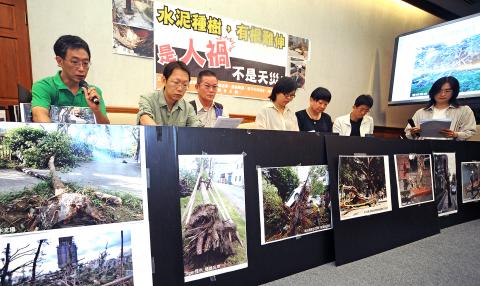The thousands of trees that fell over or were uprooted in Greater Taipei when Typhoon Soulik struck earlier this month were mainly a result of poor management rather than the natural disaster, environmental protection groups and a legislator said yesterday.
The groups showed photographs of trees on sidewalks growing out of small holes in the cement just a little wider than their trunks, as well as photographs of toppled trees with their roots still covered in plastic wrapping or in pots, taken after Typhoon Soulik swept through the Greater Taipei area.
Democratic Progressive Party Legislator Lin Shu-fen (林淑芬) said nearly 5,000 trees were seriously damaged in Taipei and New Taipei City (新北市) when the typhoon struck, but this should be blamed on the government for not caring about letting trees grow healthily.

Photo: Liu Hsin-de, Taipei Times
Lin, who recently visited Singapore to investigate its policies and regulations on protecting street trees, said Taiwan lacks a government authority in charge of maintaining trees in urban areas, a comprehensive national policy on the management of street trees and related regulations.
“Singapore’s tree-cover rate in urban areas is about 46 percent. They have many tree doctors responsible for taking care of every street tree, who would be at fault if any tree falls down due to illness or improper care,” she said.
Showing the regulations in Japan for planting street trees, which detail the optimum soil pH levels for trees, the best grain size of the soil, planning for good drainage, as well as various other requirements, Lin Chang-mao (林長茂) of the Green Formosa Front said street trees in Taiwan are often planted sloppily by only “digging a hole to put the tree in,” which results in many “ill-growing” trees.
Showing several examples found in New Taipei City, Pan Han-chiang (潘翰疆), head of a tree protection volunteer group, said many tree pits were too small for the trees’ roots to grow and extend deep into the soil to anchor them firmly. It is then only natural that these trees were uprooted by the typhoon’s strong winds.
“It’s like the ancient Chinese custom of ‘foot binding.’ The trees are being mistreated and are in pain, but they cannot speak out,” said former People First Party (PFP) legislator Chang Show-foong (張曉風), who is also the author of a textbook article called “Street Tree.”
Tamkang University transportation management associate professor Chang Sheng-hsiung (張勝雄) said sidewalks in Taiwan have lost many of their original functions, such as offering drainage and an appropriate space for planting healthy trees, because they were paved over with large amounts of concrete.
“Street trees not only provide shade for pedestrians in hot weather, they also soften people’s hearts — causing drivers to stay calm and drive slower,” he added.
“The government should really reflect on what has been allowed to go on and think about planting appropriate tree species, how to plant them properly and how to keep them in good health,” Chang Show-foong said.
“They should not spend taxpayers’ money on meaningless practices,” he added.

Alain Robert, known as the "French Spider-Man," praised Alex Honnold as exceptionally well-prepared after the US climber completed a free solo ascent of Taipei 101 yesterday. Robert said Honnold's ascent of the 508m-tall skyscraper in just more than one-and-a-half hours without using safety ropes or equipment was a remarkable achievement. "This is my life," he said in an interview conducted in French, adding that he liked the feeling of being "on the edge of danger." The 63-year-old Frenchman climbed Taipei 101 using ropes in December 2004, taking about four hours to reach the top. On a one-to-10 scale of difficulty, Robert said Taipei 101

Nipah virus infection is to be officially listed as a category 5 notifiable infectious disease in Taiwan in March, while clinical treatment guidelines are being formulated, the Centers for Disease Control (CDC) said yesterday. With Nipah infections being reported in other countries and considering its relatively high fatality rate, the centers on Jan. 16 announced that it would be listed as a notifiable infectious disease to bolster the nation’s systematic early warning system and increase public awareness, the CDC said. Bangladesh reported four fatal cases last year in separate districts, with three linked to raw date palm sap consumption, CDC Epidemic Intelligence

US climber Alex Honnold left Taiwan this morning a day after completing a free-solo ascent of Taipei 101, a feat that drew cheers from onlookers and gained widespread international attention. Honnold yesterday scaled the 101-story skyscraper without a rope or safety harness. The climb — the highest urban free-solo ascent ever attempted — took just more than 90 minutes and was streamed live on Netflix. It was covered by major international news outlets including CNN, the New York Times, the Guardian and the Wall Street Journal. As Honnold prepared to leave Taiwan today, he attracted a crowd when he and his wife, Sanni,

Two Taiwanese prosecutors were questioned by Chinese security personnel at their hotel during a trip to China’s Henan Province this month, the Mainland Affairs Council (MAC) said yesterday. The officers had personal information on the prosecutors, including “when they were assigned to their posts, their work locations and job titles,” MAC Deputy Minister and spokesman Liang Wen-chieh (梁文傑) said. On top of asking about their agencies and positions, the officers also questioned the prosecutors about the Cross-Strait Joint Crime-Fighting and Judicial Mutual Assistance Agreement, a pact that serves as the framework for Taiwan-China cooperation on combating crime and providing judicial assistance, Liang